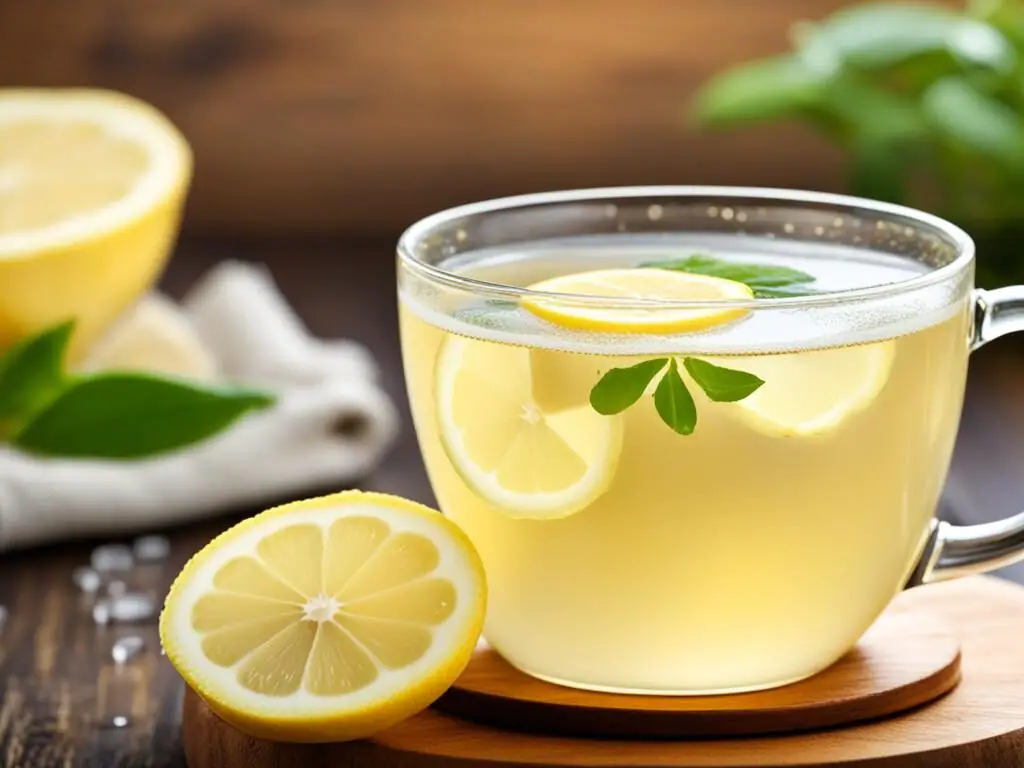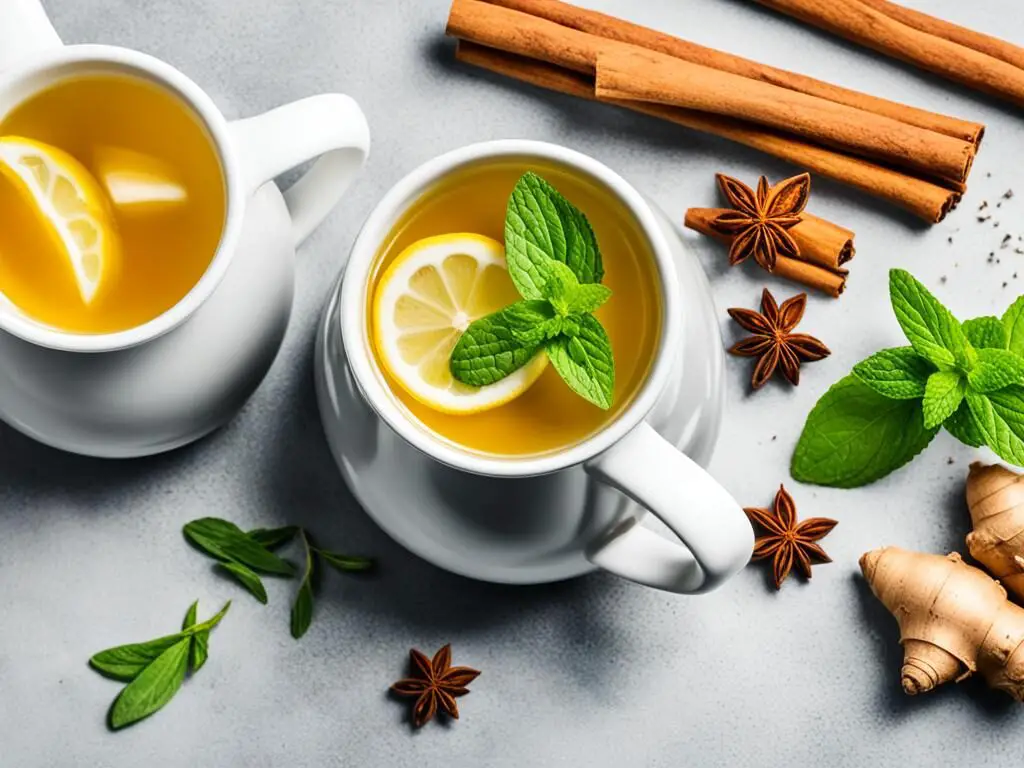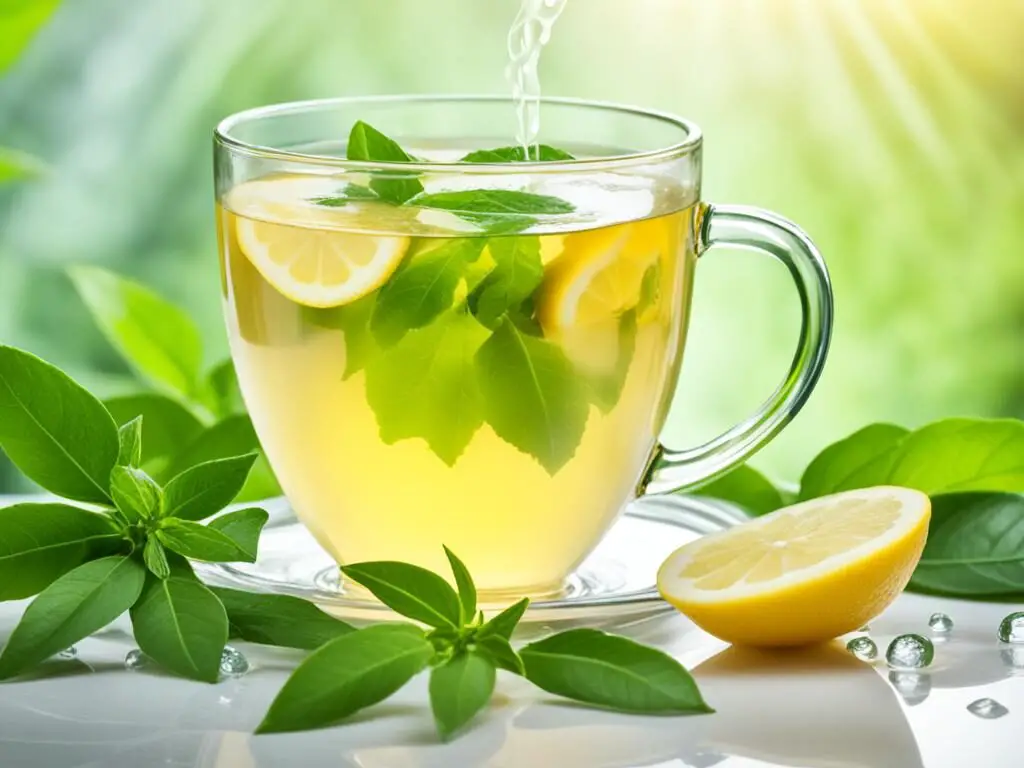Whether it’s caused by motion sickness, morning sickness, or an upset stomach, most of us have experienced the discomfort of nausea at some point in our lives. But did you know that a simple cup of ginger tea made with fresh ginger root and lemon can offer relief?

Ginger tea has been used for centuries as a natural remedy for various ailments, including nausea and vomiting. This humble root has powerful anti-inflammatory properties and contains compounds that can soothe the digestive system, helping to calm an upset stomach and alleviate feelings of queasiness.
In this article, I will guide you through a step-by-step process of making your own anti-nausea ginger tea using fresh ginger root and lemon. Get ready to discover a simple, yet effective, way to find natural relief from nausea and enjoy the soothing flavors of ginger tea.
Key Takeaways:
- Ginger tea made with fresh ginger root and lemon can provide natural relief from nausea and vomiting.
- Ginger has anti-inflammatory properties that can soothe the digestive system.
- By following a simple recipe, you can easily make your own anti-nausea ginger tea at home.
- Drinking ginger tea can help settle your stomach and alleviate feelings of queasiness.
- Ginger tea has been used for centuries as a natural remedy for various ailments.
The Health Benefits of Ginger Tea
When it comes to promoting overall well-being, ginger tea is a powerhouse beverage. Not only does it offer a delicious and comforting flavor, but it also provides numerous health benefits that can improve your daily life. From easing nausea and vomiting to reducing inflammation, ginger tea has a wide range of advantages to offer.
“Ginger tea is my go-to remedy for soothing an upset stomach. It’s a natural way to alleviate nausea, and I love how it warms me up from the inside. Plus, it’s packed with antioxidants and anti-inflammatory properties!” – Amber, avid ginger tea drinker
Let’s take a closer look at some of the incredible health benefits that ginger tea has to offer:
Relieves Nausea and Vomiting
Ginger has long been used as a natural remedy for gastrointestinal issues, including nausea and vomiting. Ginger tea can help calm an upset stomach and provide relief from motion sickness, morning sickness during pregnancy, and the side effects of chemotherapy. The soothing properties of ginger can help settle your stomach and ease discomfort.
Reduces Inflammation
Inflammation is a common underlying factor in many chronic diseases, such as arthritis and heart disease. Ginger tea contains powerful anti-inflammatory compounds called gingerols, which can help reduce inflammation in the body. By incorporating ginger tea into your daily routine, you may experience a decrease in pain and inflammation associated with various conditions.
Boosts Immune Function
Ginger tea is rich in antioxidants that can help strengthen your immune system. Antioxidants help protect your body against oxidative stress and damage caused by free radicals. By including ginger tea in your diet, you can support your immune system and potentially reduce the risk of developing certain illnesses.
Improves Digestion
If you struggle with digestive issues such as bloating, indigestion, or constipation, ginger tea may provide relief. The active compounds in ginger can stimulate digestion, promote the production of digestive enzymes, and help regulate bowel movements. Enjoying a cup of ginger tea after a meal can aid in digestion and promote a healthy gut.
These are just a few of the many health benefits that ginger tea has to offer. By incorporating this flavorful beverage into your routine, you can take advantage of its natural properties and improve your overall well-being.
What You’ll Need to Make Ginger Tea
To create a flavorful and aromatic cup of ginger tea, you’ll need the following ingredients:
- Ginger root: Fresh ginger root will infuse your tea with a warm, spicy flavor.
- Lemon juice: Adding a squeeze of lemon juice enhances the taste and provides a subtle citrusy tang.
- Fresh mint leaves: Mint leaves contribute a refreshing and cooling element to the tea.
- Tea bag (optional): If you prefer a stronger tea flavor, you can add a tea bag of your choice. Green tea or herbal tea blends work well.
- Turmeric root (optional): Adding turmeric root to your ginger tea can provide additional health benefits and a unique earthy note.
Remember to use fresh, high-quality ingredients to ensure the best flavor and potential health benefits in your ginger tea.
By combining these ingredients, you’ll create a delightful cup of ginger tea that offers a harmonious blend of flavors and potential health benefits.
| Ingredients | Benefits |
|---|---|
| Ginger root | Anti-inflammatory properties, aids digestion, relieves nausea |
| Lemon juice | Boosts immune system, aids digestion, adds a citrusy flavor |
| Fresh mint leaves | Relieves indigestion, freshens breath, provides a cooling sensation |
| Tea bag (optional) | Provides antioxidants, adds depth of flavor |
| Turmeric root (optional) | Anti-inflammatory properties, potential immune-boosting effects |
Step-by-Step Guide: Making Fresh Ginger Tea
Are you ready to experience the invigorating flavors of freshly brewed ginger tea? Follow this easy step-by-step guide to create a delicious and comforting cup of ginger goodness.
Ginger Tea Recipe
To make ginger tea, you will need the following ingredients:
- Fresh ginger root (about 2 inches)
- Water (2 cups)
That’s it! With just two simple ingredients, you can enjoy a warm and soothing cup of ginger tea.
Step 1: Prepare the Ginger
Start by peeling the ginger root to remove the outer skin. Use a sharp knife or a vegetable peeler for this step. Once peeled, finely chop or grate the ginger to release its aromatic oils.
Step 2: Brew the Ginger
Next, bring the water to a boil in a saucepan. Add the chopped or grated ginger to the boiling water and let it simmer for about 10 minutes. This will allow the flavors of the ginger to infuse into the water, creating a fragrant and flavorful tea.
Pro tip: If you prefer a stronger ginger flavor, you can simmer the ginger for a longer period of time. Just be mindful that the taste may become more intense.
Step 3: Strain and Serve
Once the ginger tea is done simmering, remove the saucepan from the heat and strain the tea to remove any ginger residue. Pour the strained ginger tea into your favorite mug or teacup.
If desired, you can add a squeeze of lemon juice or a dash of honey to enhance the flavor of your ginger tea. Fresh mint leaves or a pinch of turmeric can also be wonderful additions to experiment with.
Step 4: Enjoy!
Now, take a moment to savor the aroma and taste of your freshly brewed ginger tea. Wrap your hands around the warm cup, inhale deeply, and let the soothing properties of ginger embrace you. Sip slowly and experience the invigorating and comforting effects of this natural elixir.

Health Benefits of Ginger Tea
| Health Benefits | Description |
|---|---|
| Promotes Digestion | Ginger tea aids in digestion, relieving bloating and indigestion. |
| Reduces Nausea | Ginger tea is known for its anti-nausea properties, providing relief from motion sickness and morning sickness. |
| Relieves Inflammation | The anti-inflammatory compounds in ginger tea may help reduce inflammation in the body. |
| Boosts Immune System | Ginger tea contains antioxidants that can strengthen the immune system and protect against infections. |
Now that you know how to make fresh ginger tea, it’s time to indulge in the wonderful flavors and health benefits it offers. So go ahead, brew a cup of this invigorating beverage, and enjoy the soothing embrace of ginger tea.
Variations and Enhancements for Ginger Tea
When it comes to ginger tea, there are endless possibilities for variations and enhancements. Adding different ingredients can elevate the flavors and provide unique health benefits. Whether you’re a fan of tangy lemons or the vibrant color of fresh turmeric, or if you’re looking to combine ginger tea with black tea for an extra kick, this section will inspire you to experiment and discover your favorite ginger tea creations.
If you want to add a zesty twist to your ginger tea, try squeezing some fresh lemon juice into your brew. The tartness of lemons complements the spiciness of ginger, creating a refreshing and invigorating combination. Plus, lemons are rich in vitamin C, offering an additional boost to your immune system.
For those looking to explore new flavors, consider incorporating fresh turmeric root into your ginger tea. Turmeric brings a warm and earthy taste to the blend and adds a vibrant golden hue. Not only does turmeric provide potential anti-inflammatory benefits, but it also contains curcumin, a compound known for its antioxidant properties.
Another way to enhance your ginger tea is by combining it with black tea. This marriage of flavors results in a robust and aromatic infusion with a hint of spiciness. Black tea is also rich in antioxidants and may help improve heart health and boost energy levels.
Experimenting with these variations can be a fun and delightful journey. Feel free to mix and match ingredients according to your preferences and explore new ways to enjoy your ginger tea.
Here’s a table summarizing the variations and enhancements for ginger tea:
| Ginger Tea Variation | Ingredients |
|---|---|
| Lemon Ginger Tea | Ginger root, lemon juice |
| Turmeric Ginger Tea | Ginger root, fresh turmeric root |
| Ginger Black Tea | Ginger root, black tea |
As you can see, each variation offers a distinct flavor profile and potential health benefits. Don’t be afraid to get creative and tailor your ginger tea to suit your taste preferences and wellness goals.

The Potential Health Benefits of Drinking Ginger Tea
When it comes to promoting overall health and wellness, ginger tea is a superstar. Its long list of potential health benefits makes it a popular choice for those seeking natural remedies. From reducing inflammation and aiding digestion to supporting weight loss efforts and bolstering immune function, ginger tea provides a wide range of advantages that can contribute to a healthier lifestyle.
Ginger tea benefits are attributed to its active compounds, such as gingerols and shogaols, which have antioxidant and anti-inflammatory properties. These compounds can help reduce oxidative stress and ease inflammation in the body. By incorporating ginger tea into your daily routine, you may experience the following health benefits:
Eases Digestive Issues
Ginger has long been used as a natural remedy for digestive discomfort. Ginger tea can help alleviate symptoms like bloating, indigestion, and stomach cramps. It aids digestion by stimulating the production of digestive enzymes, promoting smooth digestion, and relieving nausea and vomiting.
Reduces Inflammation
The anti-inflammatory properties of ginger make it a potent tool to combat inflammation in the body. Chronic inflammation is linked to various health conditions, including heart disease, arthritis, and certain types of cancer. By incorporating ginger tea into your routine, you may help reduce inflammation and its associated risks.
Promotes Weight Loss
Ginger tea may support weight loss and management efforts. It can increase metabolism and fat burning, which can contribute to weight loss over time. Additionally, ginger tea can help control appetite and reduce cravings, making it easier to stick to a healthy eating plan.
Boosts Immune Function
Ginger tea can bolster your immune system due to its antioxidant and antimicrobial properties. It can help strengthen the body’s defenses against infections and support overall immune function. Regular consumption of ginger tea may help reduce the risk of common illnesses and keep your immune system strong.
It’s important to note that while ginger tea may provide various health benefits, it is not a substitute for medical treatment or professional advice. If you have any specific health concerns, it’s always best to consult with a healthcare professional.
Now that you’re aware of the potential health benefits of ginger tea, it’s time to incorporate this flavorful beverage into your daily routine. Discover the joy of sipping on a warm cup of ginger tea and reap the rewards for your overall well-being.

| Health Benefits of Ginger Tea | How it Helps |
|---|---|
| Alleviates digestive issues | Stimulates digestion, relieves bloating and stomach cramps |
| Reduces inflammation | Has anti-inflammatory properties, helps reduce oxidative stress |
| Aids weight loss | Increases metabolism, promotes fat burning, suppresses appetite |
| Boosts immune function | Strengthens immune system, fights infections |
As you can see from the table above, ginger tea offers a wide range of health benefits that can positively impact your well-being. Whether you’re looking to improve digestion, reduce inflammation, manage weight, or enhance your immune system, incorporating ginger tea into your routine is a simple and enjoyable way to support your overall health.
Tips for Making Ginger Tea at Home
Making ginger tea at home is incredibly easy and allows you to customize the flavors according to your preferences. Here are a few simple tips to help you make the perfect cup of ginger tea:
- Choose fresh ginger: When making ginger tea, it’s best to use fresh ginger root for maximum flavor. Look for ginger root that is firm and smooth, without any wrinkles or soft spots.
- Peel and slice the ginger: Use a spoon to gently peel the skin off the ginger root. Then, thinly slice the ginger to release its aromatic oils.
- Infuse the ginger: Heat water in a pot until it reaches a gentle boil. Add the sliced ginger to the pot and let it steep for about 10-15 minutes. This will allow the ginger to infuse the water with its spicy and soothing flavors.
- Add other ingredients: You can enhance the flavor of your ginger tea by adding a few additional ingredients. For a hint of citrus, squeeze in some fresh lemon juice. If you prefer a touch of sweetness, add a drizzle of honey. You can also experiment with adding other herbs or spices like mint or cinnamon for extra complexity.
- Serve and enjoy: Once the ginger tea has steeped to your desired strength, strain it into a cup or mug. Take a moment to inhale the fragrant steam before taking your first sip. Savor the warmth and comforting flavor of your homemade ginger tea.
“Making ginger tea at home allows you to control the ingredients and create a cup of tea that suits your taste buds. Plus, it’s a budget-friendly alternative to buying pre-packaged ginger tea bags.”
So why not give it a try? Making ginger tea at home is a rewarding experience that can easily be incorporated into your daily routine. Enjoy the soothing and invigorating flavors of ginger tea whenever you need a comforting pick-me-up.
| Tips for Making Ginger Tea at Home |
|---|
| Choose fresh ginger |
| Peel and slice the ginger |
| Infuse the ginger |
| Add other ingredients |
| Serve and enjoy |
Conclusion
In conclusion, learning how to make anti-nausea ginger tea with fresh ginger root and lemon is a wonderful skill to have. Not only does it provide natural relief from nausea, but it also offers numerous health benefits. By following the simple steps outlined in this article, you can easily create your own homemade ginger tea and enjoy its soothing and refreshing flavors.
FAQ
How do I make anti-nausea ginger tea with fresh ginger root and lemon?
To make anti-nausea ginger tea, start by peeling and slicing fresh ginger root. Bring a pot of water to a boil, then add the ginger slices and let it simmer for about 10-15 minutes. Remove from heat, strain the tea into a mug, and squeeze in fresh lemon juice to taste. You can also add a touch of honey for sweetness if desired. Enjoy the soothing aroma and flavors of homemade ginger tea!
What are the health benefits of ginger tea?
Ginger tea offers several health benefits. It is known to alleviate nausea and vomiting, reduce inflammation, improve digestion, boost immunity, and even assist in weight loss. The natural compounds in ginger have anti-inflammatory and antioxidant properties, making ginger tea a healthy and flavorful beverage of choice.
What ingredients do I need to make ginger tea?
To make ginger tea, you will need fresh ginger root, lemon juice, fresh mint leaves (optional for added freshness), a tea bag (optional for added flavor), and turmeric root (optional for enhanced health benefits). These ingredients can be easily obtained from a local grocery store or farmer’s market.
Can you provide a step-by-step guide for making fresh ginger tea?
Certainly! Here is a step-by-step guide on how to make fresh ginger tea: 1. Peel and thinly slice fresh ginger root. 2. Bring a pot of water to a boil. 3. Add the ginger slices to the boiling water. 4. Let the mixture simmer for about 10-15 minutes. 5. Remove from heat and strain the tea into a mug. 6. Squeeze fresh lemon juice into the tea to taste. 7. Optional: Add a teaspoon of honey for sweetness. 8. Stir well and enjoy your homemade ginger tea!
What are some variations and enhancements I can try for ginger tea?
There are several variations and enhancements you can experiment with for ginger tea. You can add a slice of fresh turmeric root for an additional health boost, or squeeze in some lemon juice for a tangy twist. If you enjoy stronger flavors, try combining ginger tea with black tea for a unique blend. You can also adjust the amount of ginger per your preference to make the tea more or less spicy.
What are the potential health benefits of drinking ginger tea?
Drinking ginger tea regularly can have various health benefits. Ginger tea may help reduce inflammation, alleviate digestive issues, aid in weight loss, boost the immune system, improve circulation, and promote overall well-being. The natural compounds found in ginger root contribute to these potential health benefits and make ginger tea a valuable addition to a healthy lifestyle.
Any tips for making ginger tea at home?
Absolutely! Here are some tips for making ginger tea at home: – Use fresh ginger root for the best flavor and health benefits. – Experiment with different proportions of ginger and lemon juice to find your perfect balance. – Don’t be afraid to add other herbs or spices like fresh mint leaves for more complexity. – For convenience, consider using a tea bag for a quicker cup of ginger tea. – Use a fine-mesh strainer or cheesecloth to strain the tea and remove any ginger fibers. – Feel free to adjust the sweetness by adding honey, maple syrup, or your preferred sweetener. – Store any leftover ginger tea in the refrigerator for up to 2-3 days.